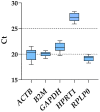Inflammation and Starvation Affect Housekeeping Gene Stability in Adipose Mesenchymal Stromal Cells
- PMID: 38275668
- PMCID: PMC10814131
- DOI: 10.3390/cimb46010054
Inflammation and Starvation Affect Housekeeping Gene Stability in Adipose Mesenchymal Stromal Cells
Abstract
Due to the scientific success of in vitro and in vivo model studies, the interest in using mesenchymal stromal cells (MSCs) for the treatment of orthopaedic conditions is growing. In the context of osteoarthritis (OA), MSCs, and, in particular, those derived from adipose tissues (ASCs), have found broader access to clinical use as active components of minimally manipulated orthobiologics, as well as clinically expanded cell preparations, or to collect their released factors (secretome) for cell-free approaches. In this regard, while both inflammatory priming and starvation are common strategies used to empower cell potency or collect the secretome, respectively, little is known about the possible influence of these approaches on the stability of housekeeping genes (HKGs) for molecular studies able to fingerprint cell phenotype or potency. In this report, the reliability of five commonly used HKGs (ACTB, B2M, GAPDH, HPRT1 and RPLP0) was tested in ASCs cultured under standard protocol after inflammatory priming or starvation. Gene expression data were computed with four different applets able to rank genes depending on their stability in either single or combined conditions. The obtained final ranking suggests that for each treatment, a specific HKG is needed, and that starvation is the condition with the stronger effect on HKGs' stability and, therefore, reliability. The normalization effect of proper HKGs' use was then validated on three genes involved in OA and whose product is released by ASCs. Overall, data presented herein confirm that the choice of the best HKG has to be carefully considered and that each specific condition has to be tested to identify the most reliable candidate.
Keywords: housekeeping genes; inflammation; mesenchymal stromal cells; osteoarthritis; regenerative medicine; secretome; starvation.
Conflict of interest statement
The authors declare no conflicts of interest. The funders had no role in the design of the study; in the collection, analyses, or interpretation of data; in the writing of the manuscript; or in the decision to publish the results.
Figures





References
Grants and funding
LinkOut - more resources
Full Text Sources
Research Materials
Miscellaneous

